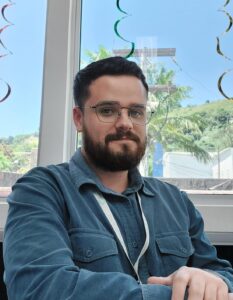Lucas Schwenck
Summary
Pharmacist and post graduation student at UFRJ. Studies antifungal and antibacterial properties of spider and tribollium castaneum eggs, and antimicrobial triage at synthetic products derived from naphtoquinones and quinilones.
Unraveling the Antifungal and Antibacterial Properties of Spider and Tribolium castaneum Eggs
Introduction:
Meet Lucas Schwenck, a dedicated pharmacist and postgraduate student at the prestigious Federal University of Rio de Janeiro (UFRJ). With an unquenchable curiosity for the natural world and a passion for improving healthcare, Lucas has embarked on a compelling research journey that explores the antifungal and antibacterial properties of spider eggs and those of the red flour beetle, Tribolium castaneum. Furthermore, his work involves evaluating the antimicrobial potential of synthetic compounds derived from naphthoquinones and quinolones, offering a multi-faceted approach to combating infectious diseases.
Spider Eggs: Nature’s Hidden Marvels:
One aspect of Lucas’s research focuses on spider eggs, a fascinating yet understudied facet of arachnid biology. These tiny structures hold incredible promise as potential sources of antimicrobial agents. By investigating the biochemical composition of spider eggs and how they fend off pathogens in their natural environment, Lucas aims to unlock new strategies for combating drug-resistant bacteria and fungi.
Tribolium castaneum: Insights from the Tiny Red Flour Beetle:
In addition to spider eggs, Lucas delves into the world of Tribolium castaneum, commonly known as the red flour beetle. This inconspicuous insect species has garnered attention for its unique antimicrobial defenses. Through meticulous laboratory experiments, Lucas seeks to understand the underlying mechanisms that enable these beetles to resist infections and how this knowledge can be harnessed for medical applications.
Synthetic Compounds: Naphthoquinones and Quinolones:
Lucas’s research goes beyond the realm of natural sources to explore the potential of synthetic compounds. Naphthoquinones and quinolones, with their well-documented antimicrobial properties, serve as the foundation for his investigations. By modifying and optimizing these compounds, Lucas aims to develop novel antimicrobial agents that can effectively combat drug-resistant microbes, thereby addressing a pressing global health challenge.
Translational Significance:
Lucas Schwenck’s work not only contributes to our understanding of the natural world but also has significant translational implications. His research has the potential to yield novel drug candidates for treating infectious diseases, especially those caused by drug-resistant pathogens. In an era where antibiotic resistance poses a growing threat to public health, Lucas’s endeavors take on added importance.
Future Prospects:
As a driven and passionate postgraduate student, Lucas Schwenck is poised to make meaningful contributions to the fields of microbiology and pharmaceutical science. His research not only broadens our knowledge of antimicrobial strategies in nature but also holds promise for the development of innovative therapeutics that can improve the lives of patients worldwide.
Lucas’s journey exemplifies the crucial role of multidisciplinary research in addressing complex healthcare challenges, and his commitment to advancing science and healthcare is a testament to the bright future that lies ahead in his career. With each experiment and discovery, Lucas brings us one step closer to a world with more effective treatments for infectious diseases.
